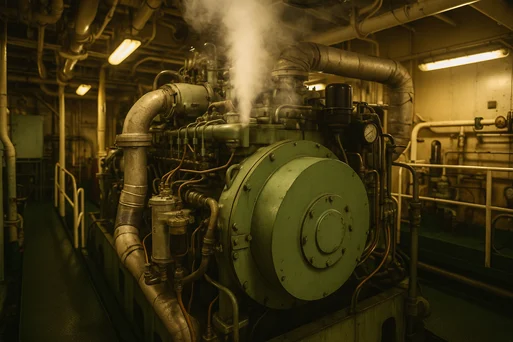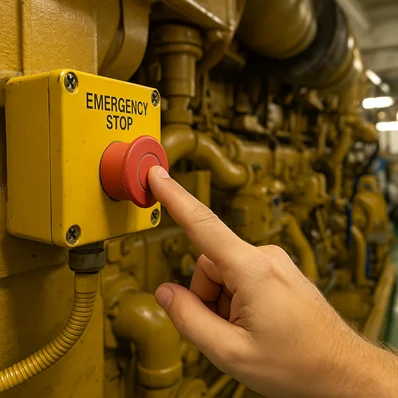When you’re out at sea, your generator is basically your heartbeat. No power? You’re blind. You’re stuck. That’s why knowing when and how to stop a diesel generator isn’t just a checklist item it can literally save your ship. Thing is, not every problem comes with a big red warning sign. Sometimes it’s just a weird sound, a bit of smoke, or a number on the panel that doesn’t feel right. And it’s in these moments when you have to trust your gut that real marine instincts kick in.
Let’s talk about 10 real reasons you may need to emergency stop your generator:
1. Strange Noises
Every generator has its own hum you just know it. So, the second you hear something off, like a knock, metallic clank, screech, or rattling don’t second guess it. It could be anything from loose bearings to valve issues or a turbocharger problem. Don’t try to figure it out while it’s running. Just stop it. Better to shut it down and be wrong than let it keep running and blow something major.
Tip from experience: Don’t assume the noise is coming from another machine. That delay could cost you.
2. Smoke
Smoke is never “just part of the process.” It’s the generator crying for help.
- White smoke? Coolant getting into the combustion chamber.
- Blue smoke? Oil’s burning maybe valve seals or turbo issues.
- Black smoke? Too much fuel, not enough air.
See any of that? Don’t troubleshoot while it’s running. Hit the stop. Then switch to the standby gen and calmly sort it out.
3. Oil Pressure
Low lube oil pressure or high oil temperature big problem.
These are your bearings’ lifelines. If pressure drops, you’re basically letting metal grind on metal. Crankshaft, piston, camshaft all at risk. Don’t just switch filters or “hope it stabilizes.
Stop the engine. Bleed air from the system, check levels, clean or replace filters, and then restart safely.
4. High Differential Pressure in Lube Oil Filters
If oil isn’t flowing properly through the filter, it builds pressure. That pressure difference (in vs. out) tells you something’s blocking it. If it crosses the safe mark, don’t push your luck. Stop, switch to standby filters but only after checking they’re bled and ready. Running it with clogged filters is like trying to breathe through a blocked nose eventually, something’s going to give.
5. Overspeed
If your generator suddenly starts racing past its speed limit, don’t wait. Emergency stop immediately before it throws a connecting rod through the block. Could be a faulty governor, firing rack stuck, or post-overhaul error. After stopping, always check crankcase bolts and internals. Don’t treat it lightly.
6. Cooling Water Issues
No cooling waters? You’re cooking your engine from the inside out. Without it, temps rise, metals expand, and you’re minutes away from a full seizure. If you spot a pump failure or a drop in pressure: Stop first. Don’t try bleeding the system while it’s running. After stopping, bar over the engine manually to avoid it locking up completely.

7. Piping Leaks
Whether it’s fuel, oil, or water leaks are never minor. Even a tiny leak can lower pressure, create fire hazards, or starve critical parts. Don’t be tempted to “tighten that one joint” while it’s running. Shut it down. Check everything. Fix or replace seals, clamps, gaskets. Over-tightening during operation is how people strip threads or warp fittings.
8. Abnormal Vibration or Shaking? Stop. Right. There.
Generators vibrate sure but when it’s not the usual hum and starts shaking like its dancing, something’s wrong. Could be loose mountings, misaligned shafts, or worse. If you ignore it, it can break turbochargers, crack supports, or even start fires. Include vibration and foundation checks in your PMS too many skips it until it’s too late.
9. Faulty Alarm or Trip System
Alarms and trips are your early warning system. If they stop working, you’re basically running blind. Never ever run a gen with disabled or broken safety systems. Test weekly. Replace faulty sensors. If the trip doesn’t work, the engine could literally run into self-destruction before you realize something’s wrong.
10. Water in the Lube Oil
Lube oil mixed with water disaster in slow motion. Water reduces lubrication, causes corrosion, and eats away at crankshafts and bearings. If you see milky oil on the stick or high moisture in lab results: Stop. Don’t risk it. Find the leak (could be cooler or liner), fix it, drain everything, refill with fresh oil. Never run-on contaminated oil. It’s like giving poison to the engine and hoping it doesn’t notice. But these engines are designed with emergency stop systems for a reason.


